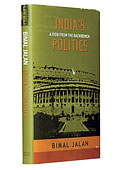 |
INDIA'S POLITICS: A
VIEW FROM THE BACKBENCH
By Bimal Jalan Penguin Viking
Pp: 244
Price: Rs 350 |
Bimal Jalan is one of
the people who put in place the economic policies whose effects
are being applauded the world over. So, when he warns the nation
not to take India's place at the world's high table for granted,
it deserves deeper scrutiny and, hopefully, some action. The former
Reserve Bank of India governor is now a nominated member of the
Rajya Sabha. This has given him an insider's view of how Parliament
functions and the often fractious relationship between the executive,
the legislature and the judiciary.
But his primary concern remains the Indian political system's
seeming lack of preparedness to deal with coalitions and, more
particularly, the emergence of small one-to-five mp parties that
switch allegiance from one coalition to the other depending not
on esoteric ideological considerations, but on more base political
ones. Also, he says, the compulsions of coalition politics may
force the government of the day to pass laws that may not necessarily
be good for the country as a whole. This, and the degeneration
of the institutions of state, Jalan feels, can seriously undermine
the edifice of India.
"In a nutshell, without meaning to be provocative, I believe
that if some of the emerging trends are not reversed, India's
democracy by the people, will become more and more 'oligarchic'-i.e.,
of the few and for the few," he writes.
But it's not a doomsday book. On the other hand, its underlying
tone is cheerful as it notes with the quiet satisfaction so typical
of the author that the country has progressed to a point where
it is the toast of the world, despite running on flat tyres for
most of its existence as an independent nation. There are some
slightly amusing sidelights as well. Despite being the architect
of some of the measures that have taken India out of the economic
rut it had dug for itself, he confesses that "it is hard
to believe that, not so long ago, India was a slow-growing poor
developing country which was lurching from one crisis to another.
It was dependent on aid to meet its perpetual deficits... The
same India is now projected as one of the most important countries
in the world".
He suggests a mixed bag of 10 measures that he feels will ensure
that there are no goof-ups in the journey from here to the higher
reaches of the league of nations. We say mixed bag because some
of these measures are perfectly doable, while others will require
a level of political will that no government has displayed in
a long time.
But still, this book is important not because of the remedies
it suggests, but because it correctly diagnoses the malaise when
others see only a glorious future.
 |
|
EVERYDAY GREATNESS
By Stephen R. Covey
Pearson
Pp: 445
Price: Rs 499
|
Cust as not everyone who reads
this magazine is a CEO, not everyone in this world is a great
inventor, painter, musician or mathematician. Most of us are just
ordinary folks, trying hard to be good employees, citizens, friends
or parents. That means, except for a small circle of family and
friends, no one will know about our existence in or eventual departure
from this world. Don't get depressed. That's how it is meant to
be. Yet, once in a while a person will come along who makes a
lasting impression on you-perhaps, even changes your life forever.
That person may not be rich and famous, but just a co-passenger
on a train or an airplane. What he has, though, is what Stephen
Covey calls everyday greatness-something that "has to do
with character and contribution…a way of living".
Put together by David K. Hatch, an organisational effectiveness
consultant, Greatness is a compilation of 63 of Reader's Digest's
most inspiring stories. In it you will encounter stories of courage,
hope and dignity. Some of them will appeal to you more than some
others, but almost all of them will make you think about the purpose
of your own life. It's anything but a business book, but the sort
that you'd want to gift your family and friends.
|






